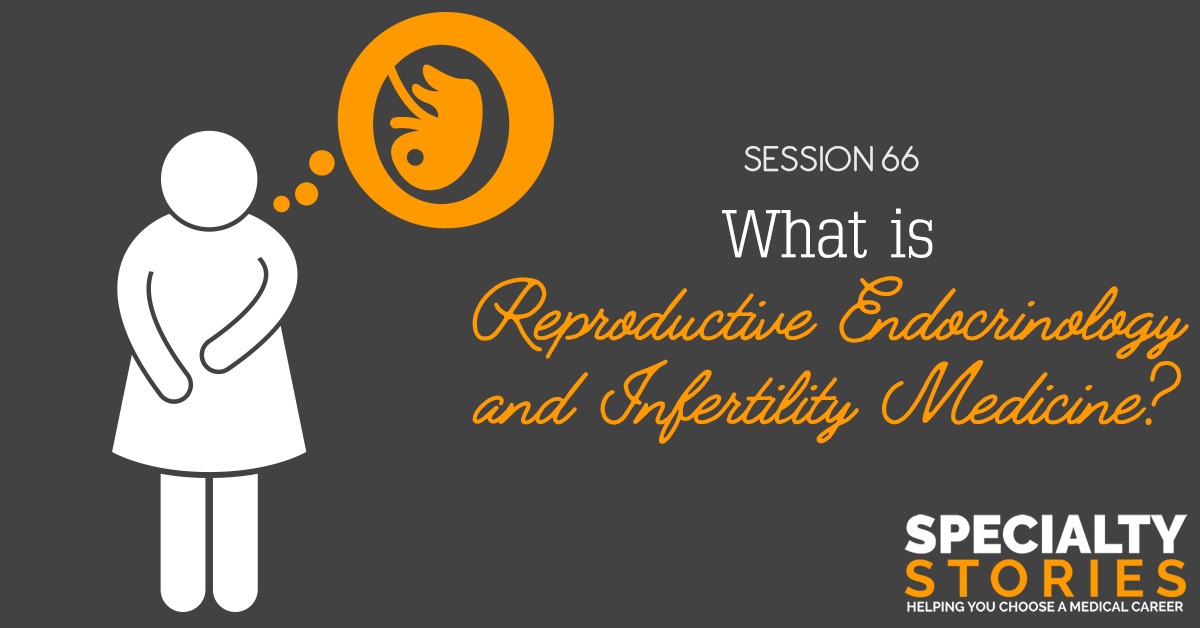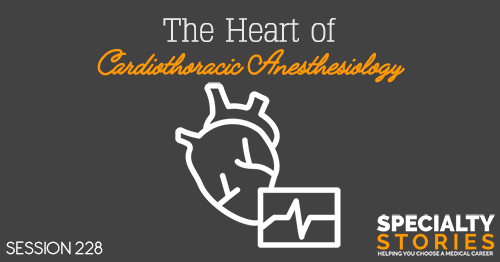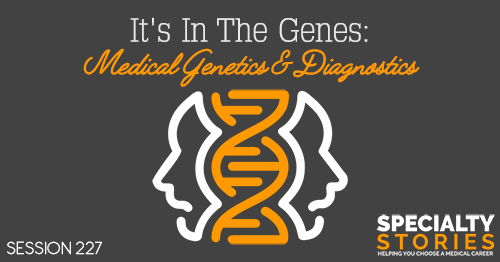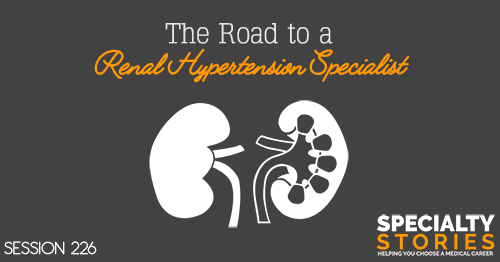Apple Podcasts | Google Podcasts

Session 66
Dr. Natalie Crawford, found on Instagram at @nataliecrawfordmd, is a Reproductive Endocrinology and Infertility (REI) specialist and she talks to us about it today.
Natalie is trained as an OB/GYN but did Fellowship training in REI. And if you’re an OB/GYN resident listening to this and thinking whether REI is right for you, then take a listen.
Natalie has been out of fellowship training now for a year and a half. In her Instagram profile @nataliecrawfordmd, she shows the ins and outs of being an REI doc as well as being a mom and female physician.
Check out today’s episode to find out why Natalie chose Reproductive Endocrinology and Infertility as well as why she actually chose to change residencies. She actually started off in one residency and then changed to OB/GYN after her first year.
By the way, we’re constantly in search of awesome specialists to be a guest on this show, so if you know someone you’d like to recommend, please shoot me an email at ryan@medicalschoolhq.net or message me on Instagram and Twitter.
[02:00] Interest in Being an REI Doc
Natalie actually had a hard time deciding what to go into during medical school. But she loved all the all the fields that involved clinical care of patients. She remembers just loving taking care of people in her third and fourth year. She had a hard time deciding but she ended up matching into Emergency Medicine (EM). She did a year of EM before she switched to OB/GYN. So she really didn’t really know continuative care and taking care of patients for more than just one encounter.
Until she started having very brief encounters with them and feeling like something was lacking as a physician. When she realized this during her Emergency Medicine internship, she started seeking out some mentors and realized she really loved women’s health and this led her to OB/GYN.
In her OB/GYN residency, she discovered a passion for the endocrine system and for patients struggling with fertility. Hence, this has led her to do REI. For one, she really loved the relationship with the patients. And they’re not just brief encounters. Her new patient visits are 45 minutes long. So she gets to understand their history, both the male and female partners. She gets to understand everything they’ve gone through. So it’s that having that type of connection with the patient and trying to see them from a point of being very low to being very high with the goal of pregnancy was what really drew her to the field. She also got fascinated by how all these hormones work together with all the feedback loops. She loves this part of the body and how it was puzzled that made a lot of sense.
[Tweet “”Patients who are struggling to start a family feel like they’re missing out on something that most other people can achieve so easily.” https://medicalschoolhq.net/ss-66-what-is-reproductive-endocrinology-and-infertility-medicine/”]
[04:35] Her Thought Process in Figuring Out It was a Wrong Specialty
Natalie always encourages students to not be afraid. She was very fearful having heard many people discouraging her to go to OB/GYN because of the lifestyle. Or that she’s not going to be happy in the surgical field if she wants to have a family. She wouldn’t want to work that hard otherwise she’d never be a wife or a mom.
And that fear has led her to not wanting to do things even if she was really drawn to them. Not to mention, she didn’t have any mentors who knew her well enough to give her the best advice. So her advice to students is to not being fearful of things and to find a mentor that can help guide you along the path.
[Tweet “”Find a mentor who can get to know you well enough and help guide you, either validate or put away some of those fears so you can make a decision that really sets what your goals are.” https://medicalschoolhq.net/ss-66-what-is-reproductive-endocrinology-and-infertility-medicine/”]
[05:50] Traits that Lead to Being a Good REI Doctor
Natalie describes OB/GYN as a notoriously difficult residency. That said, you need to have rally good work ethic. You have to be able to think quick on your feet and like taking care of patients. You should also be able to enjoy variety in that there’s a lot of primary care, surgery. Some stuff are basic, there are also some stuff that are very emergent. If you like all of those things and like taking care of women as your base population, those that go into REI are a little more particular. They like details and are perfectionists. They love the O.R. and microsurgery. You have to be able to hone in some of the small minutia.
Before Natalie switched over to OB/GYN, she knew she wanted to do a fellowship. Compared to emergency room where you notice just a little bit about everything, she loves that a subspecialist knows everything about the smaller segments. You’d really be the expert. You’re the end game that your peers come to when they have a question.
[Tweet “”I love that a subspecialist knows everything about the smaller segments. You’d really be the expert. You’re the end game that your peers come to when they have a question.” https://medicalschoolhq.net/ss-66-what-is-reproductive-endocrinology-and-infertility-medicine/”]
Other specialties that she actually considered include maternal fetal medicine which involves high risk obstetrics, combining the mother/baby endocrine system and a lot of how disease plays into that. But she also likes REI a lot and she was drawn more to it because of the deeper relationship with the patient. She feels they’re struggling more and they really rely on their doctor heavily. Moreover, it’s a much more surgical-heavy side of the field.
[08:00] Types of Patients
Natalie has been trained in both reproductive endocrine and infertility (REI). The RE side includes puberty, abnormalities, abnormal menstrual cycles, absence of periods, and abnormalities like hair growth, thyroid. And then 90% + of what she does is all infertility. Infertility ranges from couples who have trying to conceive and just can’t to couple who know they have a problem. For instance, the woman doesn’t have a period or the man doesn’t have very much sperm and they know about that. Sometimes, there would be same sex couples who just need help to be able to get pregnant because they don’t have the gametes they need. Or sometimes it would be couples who are looking to preserve their fertility because they’re going to go through cancer treatments or they want to freeze their eggs for social reasons.
They also do preimplantation genetic diagnosis of embryos. They have to screen embryos for either known genetic diseases or some just for aneuploidy, which she describes as a hot topic in the field right now.
In terms of the percentage of patients coming to her with a known diagnosis, Natalie says it depends on the field based on where you practice and what your population is. She has a lot of referring doctors in town so she works with a lot of the general OB/GYNs. Their style really varies. So if they like infertility, they tend to like to do the workup and then send the patients to her. That said, they come to her with that piece she already knows. If they don’t, they can just come straight to her and she does the workup. So she estimates it at half and half for her patients – coming already knowing what’s going on versus coming as a blank slate.
[Tweet “”Half and half for my patients either coming already knowing what’s going on versus coming as a blank slate.” https://medicalschoolhq.net/ss-66-what-is-reproductive-endocrinology-and-infertility-medicine/”]
Moreover, she does a lot of patient education on a daily basis. Although she likes the investigation side of medicine, she really loves the counseling too. She likes to empower them to understand how their body works and their endocrine system works. She makes them understand why certain tests are being done and why they’re doing such treatments and what outcome to expect.
[10:22] A Typical Day and Week
Natalie describes it being varied days for her. She has clinic time and O.R. time. IVF can happen at any time. Her typical week is M-T-T as full clinic days involving 45-minute long new patient consultations, 30 minutes of followup visits for patients in a variety of treatment stages, and a lot of ultrasounds. She does hands-on ultrasound for patients in the process of doing fertility treatments and then making plans for them to adjust to what they do. She starts clinic at 8:30 and finish at 5. If they have IVF procedures in the mornings, she can back it up earlier and start as early as 5 in the morning sometimes.
Wednesday is her O.R. day where she operates the whole morning. Then have clinic in the afternoon. Friday mornings, she does half-day clinics.
In terms of the operation side, it is mostly hysteroscopy, which is a minimally invasive surgery inside the uterus and laparoscopy, inside the abdomen, looking for things like endometriosis or ovarian cysts. She evaluates the fallopian tubes, ovaries, uterus, etc. She could also sometimes do larger surgeries like abdominal myomectomies where they really open up the abdomen and taking fibroids out of the uterus.
[Tweet “”Most of our surgery is day surgery, 90 minutes or less, quick procedures but very rewarding.” https://medicalschoolhq.net/ss-66-what-is-reproductive-endocrinology-and-infertility-medicine/”]
Natalie adds that there are some things they can control and can’t control. When it comes to how a woman is going to respond to medications and how fast her body will grow to a point of having mature eggs, it varies for each woman. So they start their egg retrievals early morning so their clinic won’t be impacted and they won’t have to reschedule patients as much and so that they can get home at the end of the day. Some larger clinics have a dedicated IVF person and it won’t start that early.
[12:52] Taking Calls and Work-Life Balance
In as far as taking calls, she would do a tradeoff during weekends so as she won’t have to do calls. Her counterparts have 24-hour call in the hospital but she doesn’t do that. So she will work every other weekend on Saturdays and if IVF happens then she would have to be there on a Sunday too.
Having two little kids, Natalie finds it as a constant struggle in terms of work-life balance. There are some days where the balance leans more towards the office and the practice and at other times it would lean more towards the family. This being said, she has a lot of flexibility with her schedule so she’s able to block out three hours in the middle of the day and go to a school event or a party. She stresses the importance of being able to do this.
[14:05] The Path to REI Doctor Training
You would have to spend four years of OB/GYN residency and if you want to do REI, you have to do research during you residency in some of that time being a pretty competitive field. You also have to take your written and oral OB/GYN boards to become board certified. This is followed by a three-year fellowship in REI. It’s a much easier lifestyle than an OB/GYN residency. It’s 18 months of clinical time and 18 months of research. So the research is a huge part of becoming board-certified in REI. You have to have a significant project that gets published. You have to make a thesis and be able to defend it as part of your board certification for REI.
[Tweet “”If you want to do REI, you’re probably doing research during your residency in some of that time because it’s a pretty competitive field.” https://medicalschoolhq.net/ss-66-what-is-reproductive-endocrinology-and-infertility-medicine/”]
To be competitive for REI, what Natalie recommends to students is to go to a residency program that has an REI fellowship. It’s a small field and that’s what makes it competitive. So being able to work under people who are known in the field and be able to see how they practice is key. Get a letter of recommendation from them. Do some research with them. And these things carry a lot of weight. Natalie admits that one of the reasons she was able to match into REI was having a great mentor in residency. She did basic science research in residency and sh thinks this was what really helped her stand out by showing her dedication to the field. Nevertheless, go to a place that has those people and has that REI fellowship and it will make it a lot easier for you to match into the field compared to going to a residency that does not.
[16:10] Bias Towards DOs and Subspec Opportunities
Although Natalie has seen some negative bias, she thinks they just have to stand out even more than their alloapathic counterpart. The people she respects highly in the field are DOs. Although any bias will go away once you’re in residency and you’re working hard but that said, you just have to prove that it’s something you want to do, largely by research, away rotations, etc., more than their equal counterpart might have to. Especially with the fact that DO schools are known to be a little less research-heavy than their MD school counterparts.
In terms of further opportunities to further subspecialize, Natalie says there are none. Once you’ve done all seven years of training, you can’t get past that anymore. There are people who have their own other interests. For instance, some may be interested in clinical research or have a Master’s in Public Health. Natalie has a Master’s in Science and Clinical Research she obtained during her fellowship since she really loves clinical research. Some people take PhDs because they love lab work or do Master’s in Business. But with regard to further subspecialization after REI, there is none.
[17:45] Working with Primary Care and Other Specialties
What Natalie tells to every generalist is to know what their own limitations are. If you like infertility, then reach out to them as they’d be happy to help them. But if this is something you don’t like, don’t feel like you have to do some things and don’t be afraid to refer to a subspecialist faster.
[Tweet “”What I tell every generalist is to know what their own limitations are.” https://medicalschoolhq.net/ss-66-what-is-reproductive-endocrinology-and-infertility-medicine/”]
There are some patients she had wished had come to her earlier that she felt a generalist hang on to them a little longer. And she stresses that these generalists can’t really send them too early since every patient is unique and different. So you don’t really know what their journey will look like. If they’re wanting to see a subspecialist, then don’t hesitate to send them.
[Tweet “”You can’t send them too early. Every patient is unique and different and you don’t really know what their journey will look like.” https://medicalschoolhq.net/ss-66-what-is-reproductive-endocrinology-and-infertility-medicine/”]
Other specialties they work the closest with would be urology. In terms of other special opportunities outside of clinical medicine, majority would be in research. So you can typically be in an academic institution with research depending on what your interest is.
[19:33] What She Wished She Knew
What she knows now that she wished she knew before going into REI is that the one thing she didn’t think she had as good as a handle on is how much the patients really need you. And the one thing that she could have focused on her day is that no matter what’s going on at home is you really need to focus on the couple in front of you. Although she sees many patients during the day, but for those patients sitting right in front of her for a new patient visit, this is the thing they’ve been dreading. Nobody wants to come into the infertility doctor’s office. Nobody looks forward to see her. Hence, trying to establish that relationship really early takes investing in the relationship from the very beginning. And she never really appreciated this earlier in her career than she does now.
What she likes the most about being an REI doctor is when couples bring their babies back to her, whom they’ve worked so hard for to achieve. It’s seeing a couple who has made it through the journey. She compares it to a marathon where you make it to the end. And to see they’re now a family or that their family has grown and how happy they are, and they can describe that it all makes sense to them now.
On the flip side, what she likes the least is the pregnancy loss. It’s the rollercoaster of getting so close to where you need to be. You’ve achieved the pregnancy and you’re seeing the baby grow and not succeeding for whatever reason. The heartbreak that comes from this is just amplified. And it’s really touch when this happens after a very long journey.
[Tweet “”A lot of patients would say they’d rather not just get pregnant from any given treatment than have to go through the heartbreak of miscarriage.” https://medicalschoolhq.net/ss-66-what-is-reproductive-endocrinology-and-infertility-medicine/”]
[21:42] Major Changes in the Field and Her Last Words of Wisdom
Natalie describes genetics as a the hottest in the field right now, that being genetic testing of embryos. And as they’ve gotten better at this, they’re starting to open up all new options for testing the uterus. The biggest that she sees on the horizon would be able to mature eggs inside the lab. Right now you can only mature eggs in the body and you can freeze them once they’re mature. This is what happens with the egg freezing or in IVF, you can fertilize a mature egg. This is called IVM (In Vitro Maturation). And if you can get them from the immature to the mature stage inside the laboratory, Natalie says this will definitely change the game for them as this allows for IVF to be done in a safer way. This will allow more options for fertility preservation for patients with cancer, especially at a young age.
If Natalie would have to do it all over again, she would still have chosen being an REI doctor 100%. It’s debatable whether she would have taken an extra year to do the Emergency Medicine residency but she would definitely do REI all over again.
Ultimately, her last words of wisdom for students out there is to find a mentor. Ask questions. And believe in yourself. Just because something is competitive doesn’t mean that you can’t do it. You just have to make it a priority and make sure that on a daily basis, you’re making decisions that’s in line with that priority.
[Tweet “”It’s completely attainable, you just have to want it.” https://medicalschoolhq.net/ss-66-what-is-reproductive-endocrinology-and-infertility-medicine/”]
Links:
SEARCH SITE
LISTEN FOR FREE











